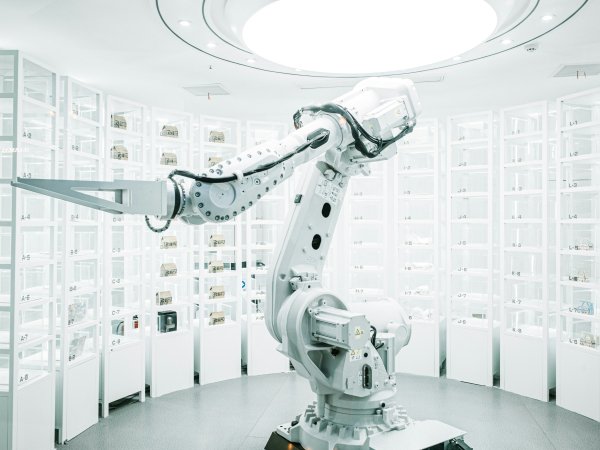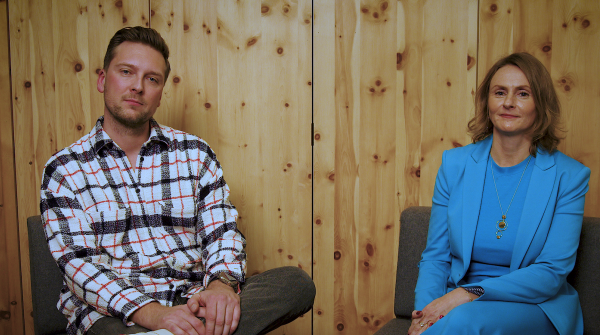In the future, doctors will have to care for more and more patients - as quickly, efficiently and cost-effectively as possible. The US company Forward Health now has a brand new idea on how this could work. Founded in 2017 by ex-Google manager Adrian Aoun, the company has invented the CarePod, a doctor's surgery with artificial intelligence - but (almost) without a doctor.
- Six-square-meter capsule replaces family doctor
- Doctors' work is scaled up with the help of AI
- Noah Labs: German AI company on the rise
- AI reacts automatically to anomalies
- AI inspiration from software studies at Harvard
- AI applications have already become established
- AI in the health sector still has a lot of potential
- Ethical and data protection concerns hinder AI progress
The six-square-metre capsule, equipped with all kinds of medical technology, is now being used in shopping malls and office buildings in the USA. It is designed to offer users the same options as a visit to the GP - almost fully automatically. A medical assistant is on site for questions and problems, but does not carry out the examinations themselves.
Services include a full-body scan, heart health, thyroid tests, blood pressure, blood tests, weight management, tests for diabetes, Covid 19 and HIV as well as for kidney and liver health. There are plenty of sensors, scanners, microphones, cameras and equipment for taking samples on board. Doctors only have to check the results transmitted to them and issue prescriptions, which are then immediately printed out in the CarePod.
They also answer patients' questions via the app and take care of referrals to specialists if necessary. A virtual voice guides patients through the procedures, which should also be easy for older people to manage. Forward CEO Adrian Aoun's vision: "We need to find ways to scale the work of doctors so that they can help more people." The subscription for all CarePod services costs 99 dollars a month.
Noah Labs is currently attracting attention in Germany. The innovative Berlin-based company specializes in the development and application of artificial intelligence (AI) to improve medical diagnostics. It is aimed at patients with cardiovascular diseases and their treating cardiology and GP practices and clinics.
"Patients can record vital signs, symptoms and biomarkers from the comfort of their own home using ECG smartwatches or internet-enabled blood pressure cuffs, for example," explains founder Oliver Piepenstock in an interview with ISPO. "In turn, medical staff can keep an eye on all values via a dashboard and receive automatic notifications in the event of abnormalities."
Piepenstock's co-founder Marcus Hott was inspired by his software research at Harvard Medical School, where he recognized the enormous potential of AI in cardiology when he developed cardiac MRI algorithms. He completed his studies at the Technical University of Munich.
"And I have experience as a founder and finance expert," says Piepenstock. "We met in the 'Entrepreneur First' incubator program. Our shared passion for groundbreaking technologies in the healthcare sector then led us to found Noah Labs."
Artificial intelligence has the potential to significantly improve the accuracy and efficiency of diagnoses, particularly in medical diagnostics. In the field of imaging, for example CT scans and MRIs, applications based on machine learning have already gained considerable acceptance.
Treating physicians are relieved by AI and can focus more on their consultations, ward rounds or the admission of new patients. In surgical procedures, AI-controlled robots improve precision and safety, leading to faster recovery times and fewer complications.
In healthcare, AI also helps with administrative tasks and can optimize staff schedules, resulting in significant cost savings.
Where is there still potential for progress through AI in medicine? Another promising area of application is voice analysis in cardiology, explains Piepenstock: "Because the human voice can provide valuable information about the state of health, including heart and respiratory rate. Disorders in heart function can also be identified in this way."
Piepenstock is convinced that in just a few years' time, "almost every healthcare professional will be equipped with an AI co-pilot to support them." In recent decades, pretty much every major industry has been transformed by technology - but the healthcare sector still has a long way to go.
Opportunities of AI in medicine
- Diagnostic support: AI systems such as IBM Watson Health analyze medical data to make more precise diagnoses and support doctors in decision-making.
- Radiology: Google's "DeepMind" is developing algorithms that analyze X-ray and MRI images and can therefore detect diseases faster than doctors.
- Advances in cancer treatment: The US company Tempus uses AI to analyse genetic and clinical data and create personalized treatment plans for cancer patients.
- Early detection of diseases: Israeli company Aidoc uses AI to analyze medical imaging data in real time and detect early signs of diseases such as strokes or pulmonary embolisms.
- Administration and workflow optimization: The US company Olive AI automates administrative tasks in hospitals, such as scheduling and billing, thereby improving efficiency.
"The healthcare sector is one of the last remaining industries," Piepenstock says. The fact that the widespread use of AI in medical practice is making slow progress also has to do with regulatory, ethical and data protection concerns. In addition, the integration of AI solutions into existing hospital infrastructures requires a lot of investment and adaptation.
Noah Labs' AI is currently being used as a pilot project in GP and cardiology practices. It is also being used in several clinical studies, for example at the Charité hospital in Berlin and a clinic in Barcelona. Noah Labs is also supported by EIT Health, one of the largest European initiatives to promote innovation in the healthcare sector. Noah Labs is also a member of the American Heart Association's Center for Health Technology and Innovation.
"We still have a lot to do. The next step is to get our innovation approved as a Class IIa medical device. We want to break the mark of more than 1,000 monitored patients."
- Awards
- Mountain sports
- Bike
- Fitness
- Health
- ISPO Munich
- Running
- Brands
- Sustainability
- Olympia
- OutDoor
- Promotion
- Sports Business
- Textrends
- Triathlon
- Water sports
- Winter sports
- eSports
- SportsTech
- OutDoor by ISPO
- Heroes
- Transformation
- Sport Fashion
- Urban Culture
- Challenges of a CEO
- Trade fairs
- Sports
- Find the Balance
- Product reviews
- Newsletter Exclusive Area
- Magazine






